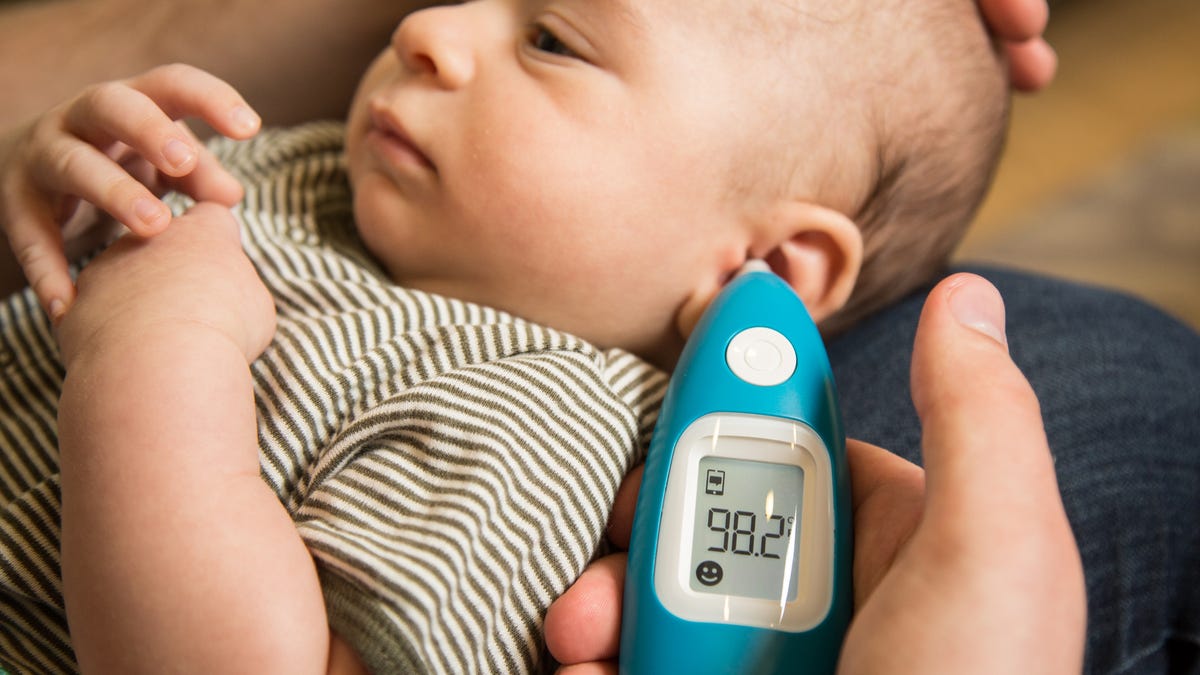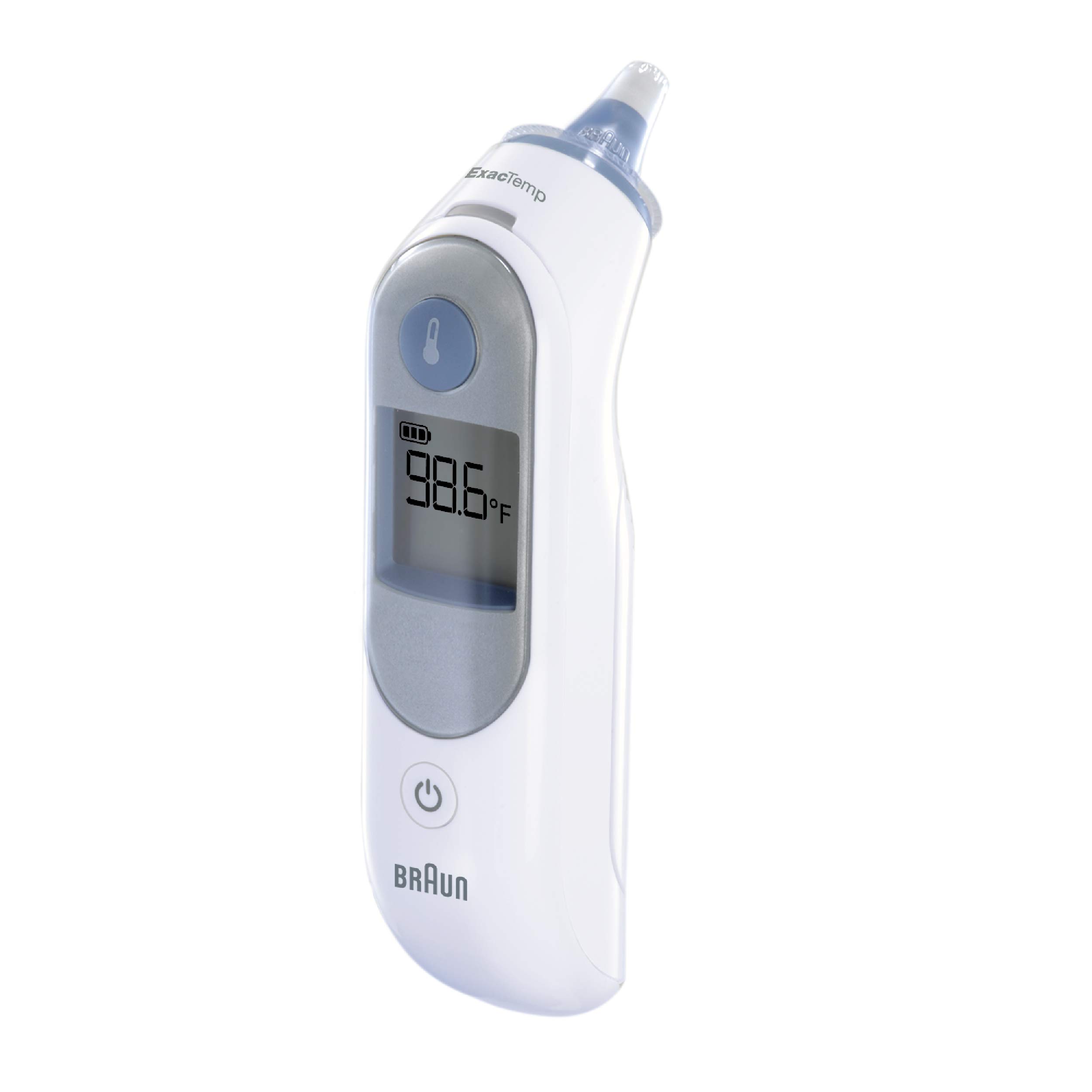Ear Thermometer for Babies: Accurate & Quick Fever Checks
When your baby feels warm or acts fussy, the first thing you want to do is check their temperature quickly and accurately. Using an ear thermometer for babies can make this task simple and stress-free for both you and your little one.
But with so many options out there, how do you choose the right one? You’ll discover everything you need to know about ear thermometers for babies—how they work, why they’re trusted by parents, and tips to get the most accurate reading every time.
Keep reading to take the guesswork out of keeping your baby healthy and comfortable.

Benefits of Using an Ear Thermometer for Babies
Ear thermometers offer many benefits for parents and caregivers. They provide a fast and easy way to check a baby’s temperature. These devices are designed to be accurate and gentle on little ears. Using an ear thermometer can make temperature taking less stressful for both babies and adults.
Speed And Convenience
Ear thermometers give results in just seconds. This quick reading saves time during check-ups. Parents do not need to wait long or hold the baby still for minutes. The small size of the device makes it easy to carry and use anytime. This convenience is helpful during night feedings or busy days.
Accuracy Compared To Other Types
Ear thermometers measure the infrared heat from the ear canal. This method often shows a more accurate body temperature than underarm or forehead thermometers. Proper use helps reduce errors and false readings. Accurate temperature helps parents decide when to seek medical advice or give medicine.
Comfort For Babies
Ear thermometers are gentle and less invasive than oral or rectal methods. They cause little discomfort or fuss during use. Babies usually stay calm because the process is quick and painless. This comfort helps parents check temperature without upsetting their child.
How Ear Thermometer for Babies Work: Technology Explained
Understanding how ear thermometers work helps parents check their baby’s temperature easily. These devices offer a quick and gentle way to measure body heat. They use modern technology to give fast and accurate readings. Let’s explore how they operate and how to use them correctly.
Infrared Technology Basics
Ear thermometers use infrared technology to detect heat. They sense the infrared energy from the eardrum and ear canal. This energy shows the body temperature inside the ear. The thermometer then changes this data into a temperature reading. It happens in just a few seconds. Infrared tech is safe and painless for babies.
Proper Placement Techniques
Correct placement is key for accurate readings. Gently pull the baby’s ear backward to straighten the ear canal. Insert the thermometer probe carefully into the ear opening. Avoid pushing too deep to prevent discomfort. Hold the thermometer steady until it beeps. This ensures the sensor reads the temperature properly. Clean the probe before and after use for hygiene.
Choosing The Right Ear Thermometer for Babies
Choosing the right ear thermometer for babies is important for quick and safe temperature checks. Babies can be fussy, so the thermometer must be easy to use and accurate. Parents want a device that gives fast results without causing discomfort. This guide helps to pick the best ear thermometer based on features, brands, and price.
Key Features To Look For
Accuracy is the most important feature in an ear thermometer. It should give precise readings every time. The device must be easy to clean to keep germs away. A fast reading time helps when the baby is restless. A clear display with backlight is useful for night use. Some thermometers offer memory recall to track past temperatures. A gentle probe tip ensures comfort during use. Battery life is also essential to avoid frequent replacements.
Top Brands And Models
Several brands make reliable ear thermometers for babies. Braun is known for accuracy and easy use. iProven offers affordable models with good features. Vicks provides fast readings with a simple design. Exergen’s models are trusted for consistent results. Each brand has models with different functions to match needs. Reading user reviews helps to find the best fit. Choose brands with good customer support for peace of mind.
Budget Considerations
Ear thermometers come in various price ranges. Basic models cost less but may lack extra features. Mid-range thermometers balance price with useful functions. High-end models offer advanced features and better accuracy. Consider how often the thermometer will be used. Spending more may be worth it for frequent checks. Compare features against your budget to get the best value. Avoid the cheapest options that compromise on quality.

Tips For Accurate Readings with Your Baby’s Ear Thermometer
Getting accurate readings with an ear thermometer is important. It helps you monitor your baby’s health correctly. Small steps can make a big difference in the results. Follow these tips to ensure precise temperature checks.
Preparing Your Baby
Make sure your baby is calm before taking a reading. Avoid taking temperature right after naps or feeding. Wait at least 15 minutes after your baby has been outside or active. Gently clean the ear with a soft cloth to remove any wax. Hold your baby steady to prevent movement during the reading.
Avoiding Common Mistakes
Do not insert the thermometer too deep into the ear. Place the tip gently and follow the device instructions. Avoid using an ear thermometer if the ear looks infected or swollen. Do not take readings immediately after bathing or swimming. Always check the battery level for accurate performance.
When To Take Multiple Readings
Take more than one reading if the first result seems unusual. Wait a few seconds between measurements for the ear to reset. Use the highest reading if there is a difference between measurements. Multiple readings help confirm your baby’s true temperature. Consistency is key for reliable monitoring.
Comparing Ear Thermometers for Babies to Other Methods
Choosing the right thermometer for babies can be tricky. Parents want a method that is fast, safe, and accurate. Ear thermometers are popular, but other options exist too. Comparing these tools helps find the best choice for your baby’s needs.
Forehead Thermometers
Forehead thermometers use infrared to read temperature on the skin. They are easy to use and quick. No contact with the ear canal is needed. This makes them gentle for babies who dislike ear checks. They work best when the forehead is clean and dry. Sometimes, sweat or dirt can affect the reading. Forehead thermometers are good for quick checks but may be less accurate than ear thermometers.
Rectal And Oral Thermometers
Rectal thermometers measure temperature inside the rectum. They provide very accurate readings. Doctors often recommend them for newborns and infants. Oral thermometers measure temperature inside the mouth. They are suitable for older children who can keep the thermometer under the tongue. These methods take longer and can be uncomfortable for babies. Rectal thermometers require careful handling and cleaning to avoid infection.
Pros And Cons Of Each
Ear thermometers give fast and fairly accurate readings. They are less invasive than rectal thermometers. They may not work well if the ear is blocked with wax. Forehead thermometers are gentle and easy to use but can be less precise. Rectal thermometers provide the most accurate results but can be uncomfortable and tricky to use. Oral thermometers are good for older kids but not suitable for babies. Choosing depends on your baby’s comfort and the situation.

Safety And Hygiene Practices
Keeping your baby safe during temperature checks is very important. Ear thermometers are quick and easy but must be clean to avoid infections. Good hygiene protects your baby and ensures accurate readings.
Cleaning The Device
Always clean the thermometer after each use. Use a soft cloth with rubbing alcohol or a disinfectant wipe. Avoid water inside the device to prevent damage. Clean the tip gently to remove earwax or dirt.
Using Disposable Covers
Disposable covers are a smart choice for hygiene. They prevent germs from spreading between uses. Place a new cover on the thermometer before each reading. Dispose of the cover immediately after use.
Avoiding Cross-contamination
Do not share the thermometer without cleaning it first. Use separate covers for each person. Store the device in a clean, dry place. These steps help stop the spread of germs and keep your baby safe.
When To Consult A Doctor
Knowing when to see a doctor is very important for your baby’s health. An ear thermometer helps track fever, but some signs need quick medical care. Understanding these signs can keep your baby safe and healthy.
Recognizing Serious Symptoms
Watch for unusual behavior like constant crying or extreme sleepiness. Difficulty breathing or persistent vomiting also needs attention. If your baby cannot eat or drink, call a doctor. Look for skin rashes or stiff neck, which may signal serious illness.
Fever Thresholds For Babies
Use the ear thermometer to check your baby’s temperature. A fever above 100.4°F (38°C) is a warning sign. For babies younger than 3 months, any fever should be checked by a doctor. Older babies with a fever over 102°F (38.9°C) need medical advice.
Emergency Situations
Seek emergency care if your baby has seizures or stops breathing. High fever with a very weak pulse or blue lips is urgent. If your baby is unresponsive or hard to wake, call emergency services. Quick action can save your baby’s life.
Frequently Asked Questions
How Accurate Is An Ear Thermometer For Babies?
Ear thermometers provide quick and accurate temperature readings. They measure infrared heat from the eardrum. Proper placement ensures reliability. Always follow manufacturer instructions for best results. They are generally as accurate as rectal thermometers for babies.
Is An Ear Thermometer Safe For Newborns?
Yes, ear thermometers are safe for babies over 6 months. For newborns under 6 months, rectal thermometers are recommended. Use gentle insertion to avoid discomfort. Always clean the probe before use to maintain hygiene.
How To Properly Use An Ear Thermometer On Babies?
Gently pull the baby’s ear back and up to straighten the ear canal. Insert the thermometer probe carefully without force. Press the button and wait for the beep. Remove and read the displayed temperature promptly.
Can Earwax Affect Ear Thermometer Readings?
Yes, excessive earwax can block infrared sensors. This may cause inaccurate temperature readings. Clean the baby’s ear gently if you suspect wax buildup. Avoid using ear candles or cotton swabs inside the ear canal.
Conclusion
Choosing a good ear thermometer helps track your baby’s health fast. It gives quick and clear readings without much fuss. This tool saves time and reduces stress during sickness. Always clean the thermometer before each use for safety. Use it gently to get accurate results every time.
A reliable ear thermometer supports better care for your little one. Keep it handy for easy temperature checks anytime. Simple steps make a big difference in your baby’s comfort. Trust your instincts and use the thermometer with care.






